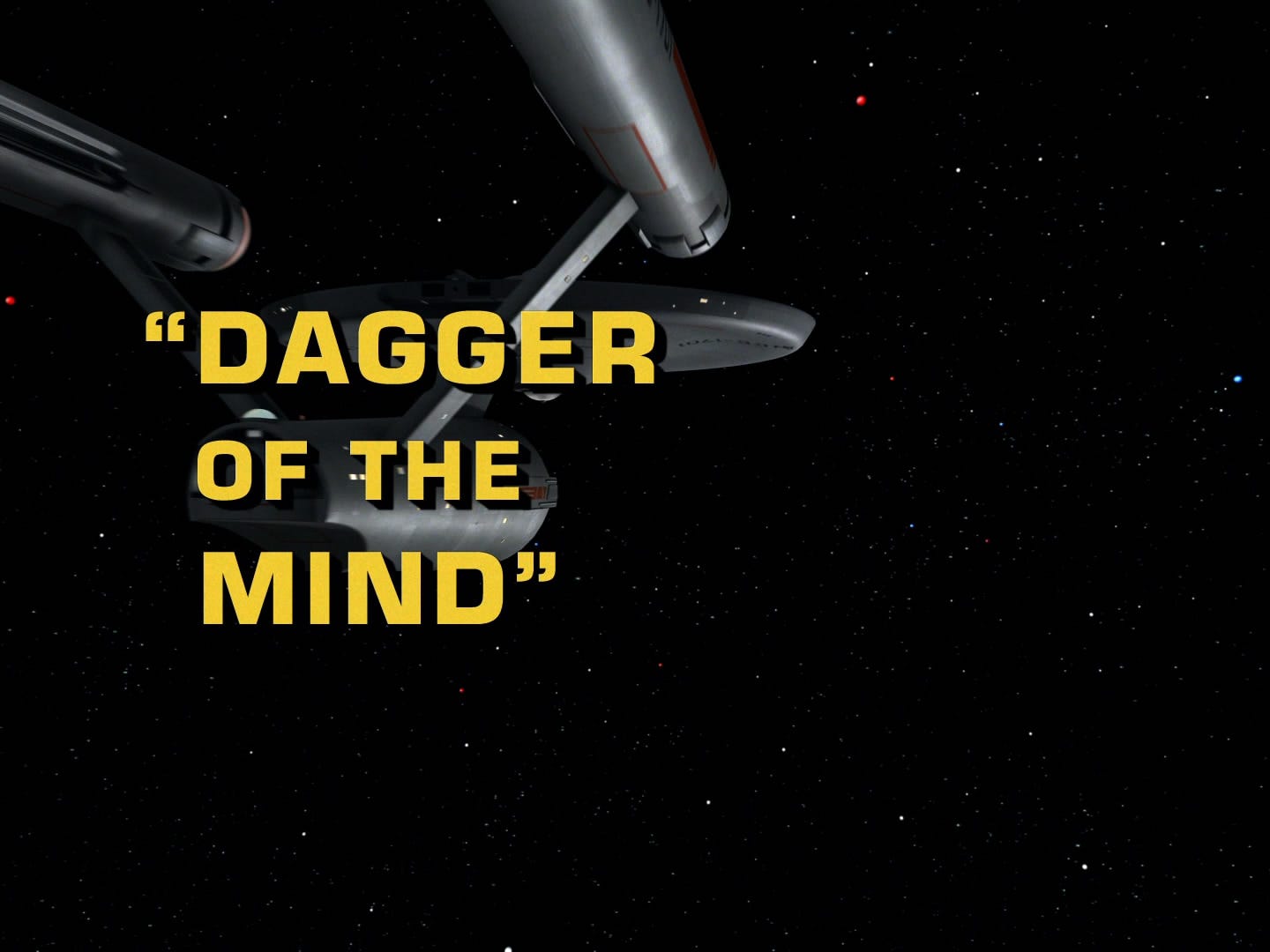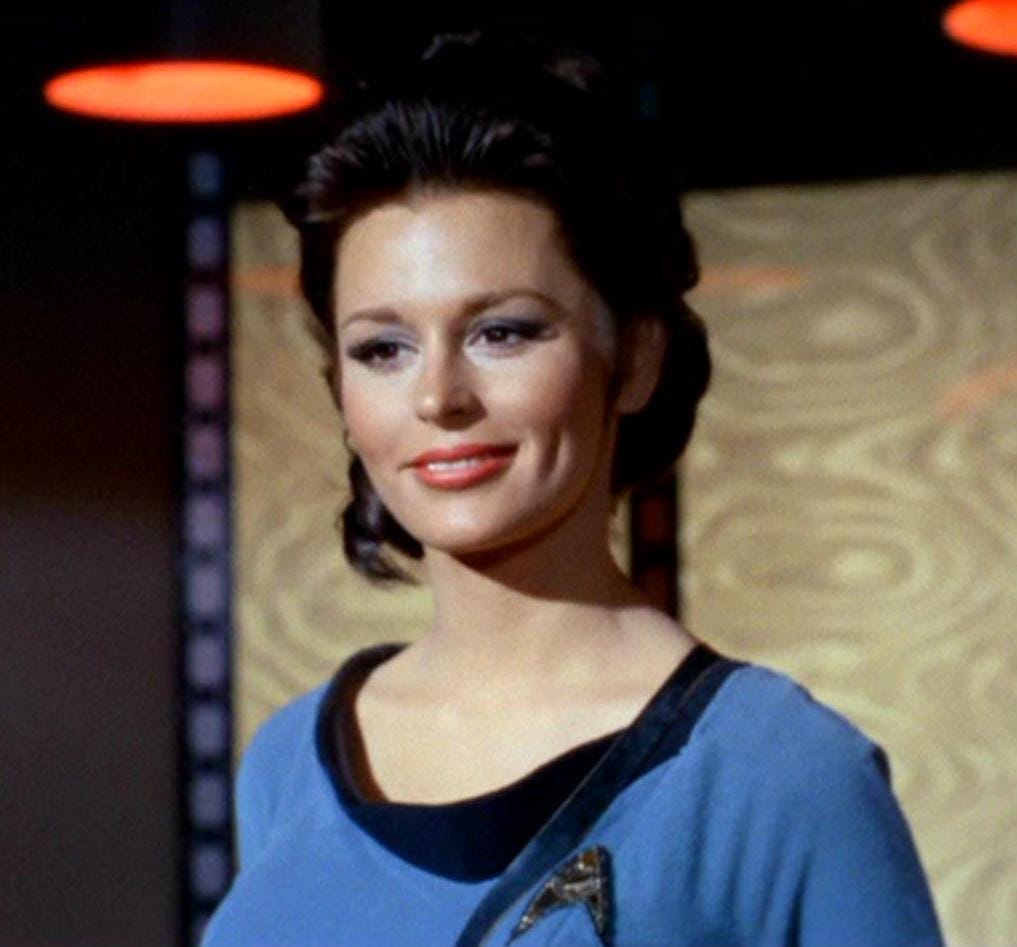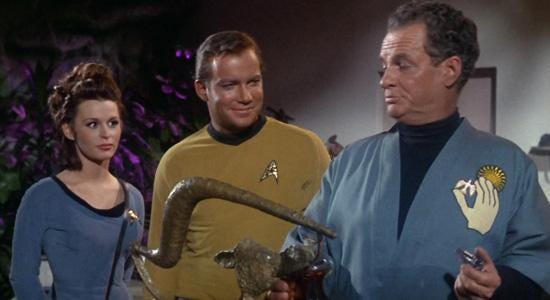"Dagger of the Mind" - Season 1, Episode 9
Trek tackles a Shakespearean theme while improving on its worst episode.
Is this a dagger which I see before me
The handle toward my hand? Come, let me clutch thee.
I have thee not, and yet I see thee still
Art thou not, fatal vision, sensible
To feeling as to sight? Or art thou but
A dagger of the mind, a false creation
Proceeding from the heat-oppressèd brain?
Writing is difficult. Blood from a stone, mightier than swords, etc. It can be a painful and personal process that involves both generation and repetition. There are words and ideas and you have to smelt the two. Brutal kind of work. Referencing canon, something established, calls up easy associations for an audience that years of criticism have already helped forge. If pens beat swords than they are weapons too; a reference is like grafting a new blade onto an old hilt. A Narsil of rhetoric. See how much that word does there?
“Dagger of the Mind” pulls its title from Macbeth. As Macbeth plans his murder of King Duncan, he soliloquies to establish his conviction and courage. He imagines a dagger that he can reach out and grasp for murderous purpose, his destiny as an object. But the dagger is not real. Macbeth kills the man anyway. After the murder he endures further hallucinations; he imagines the dagger bloody. The dagger is not real, but it is. It’s only fake when Macbeth isn’t alone.
Star Trek spends this episode interrogating these ideas through a generic, but effective, mad-scientist plot. In many ways, “Dagger of the Mind” recalls “What Are Little Girls Made Of?” but contrasts positively due to the active roles it gives the entire cast and the more interesting central evil it examines.
Patrick Stewart, another Captain of the Enterprise, performs the second dagger soliloquy in a staging of Macbeth.
The episode begins as the Enterprise delivers supplies to Tantalus V, a prison colony run by Dr. Tristan Adams (James Gregory). Kirk tells us that Dr. Adams has revolutionized the Federation’s penal system; he is a pioneering psychiatrist whose theories center around the humane rehabilitation of “the criminal mind” rather than punishment or retribution. Shatner’s performance is so telling as they dock, he makes it seem like Kirk reads the research in his spare time. As the ship prepares to leave it accepts a delivery from Tantalus V. But unknown to them, a prisoner has stowed away in the shipment. What seems like a set up for another ship-bound manhunt episode a la “The Enemy Within” burns quickly through that premise. The prisoner is found and subdued by Spock with a Vulcan nerve pinch. After transporting him to the medical bay, the crew discovers that the prisoner is actually Dr. Simon Van Gelder (Morgan Woodward), Dr. Adams’s assistant. He acts, to put it mildly, completely insane.
Dr. Adams has an explanation though. Dr. Van Gelder had unfortunately tested a new treatment on himself and been driven mad. While Kirk readily accepts the story, McCoy remains suspicious due to his inability to specifically diagnose Van Gelder. He urges Kirk to go investigate before beaming the crazed man back down and the Captain agrees, so long as Bones sends along the Enterprise’s top expert on psychiatry to help him.
Dr. Helen Noel, the Enterprise’s foremost psychiatric expert. Dr. Noel was portrayed by Marianna Hill, who went on to appear in Clint Eastwood’s directorial debut High Plains Drifter (1973), and The Godfather Part II (1974) as Fredo Corleone’s wife.
That expert is Dr. Helen Noel (Marianna Hill), who Kirk appears to have made out with at a Christmas party one time. That’s not a metaphor. Hill and Shatner convey a charming romantic awkwardness with each other throughout the episode that adds to their investigation rather than distracts. As the two tour Tantalus V, guided by Dr. Adams, they notice a strange lack of affect among the staff and prisoners, who the good doctor notes are all rehabilitated or very much on their way. Dr. Adams finally brings them to the treatment that destroyed Dr. Van Gelder’s mind: a “neural neutralizer” that can calm prisoners when used at low levels but which has the capacity to “empty” a mind at high levels, leaving only intense loneliness behind. Van Gelder, apparently impatient with the research, had used it alone at full volume.
Back on the Enterprise though, Spock is hearing a different story. At McCoy’s urging, he “mind-melds” with Van Gelder, a Vulcan technique that allows two people to share thoughts and feelings. Through the meld, Van Gelder tells Spock Dr. Adams has used the machine on prisoners to completely control and overwrite their thoughts, explaining the monotonous and blank expression throughout the colony. Spock attempts to head down with a few red-shirt ensigns and put a stop to Dr. Adams, but Tantalus V has been surrounded by its force field, making access and communication impossible.
Spock mind melds with Dr. Simon Van Gelder, played by Morgan Woodward. Woodward gives an intense performance that apparently took a lot out of him. He stated in interviews that he crashed for four days after filming due to exhaustion and took nearly a month to return to a normal level of sociability. Production liked his results though, later casting him in a Season Two episode as an entirely separate character.
Kirk has become independently suspicious. He and Noel move to test the machine safely in the middle of the night but are ambushed by Adams, who uses the neutralizer to implant an overwhelming love for Noel in Kirk’s mind. He manages to fight through his obsession’s blinding effect and hatch a plan with Noel to bring down the force field to allow a rescue. Surprisingly, the plan goes off without a hitch, as Noel karate kicks one of Adams’s goons into some wiring and allows Spock to beam down and rescue Kirk from another neutralizer session. Adams ends up in the chair instead, his mind completely emptied as power to the facility is restored. Left alone “without even a tormentor for company,” Adams succumbs to the feeling of isolation and dies.
Back on the Enterprise, McCoy is surprised by Adams’s demise.
MCCOY: It’s hard to believe that a man could die of loneliness.
KIRK: Not when you’ve sat in that room. Take us out of orbit, Mister Spock.
As said above, this episode contrasts favorably with “What Are Little Girls Made Of?” Both feature Kirk descending to a mad-scientist’s evil lair with an attractive crewmate, being captured and experimented on, and then being rescued by a mix of Spock and his own ingenuity. But this episode is much more successful than that earlier effort. Noel has better chemistry with Kirk than Nurse Chapel did, and the romantic (or at least physical) history there provides the episode’s funniest scene, discussed in Stray Thoughts below. Spock and McCoy are also given a more active role in the episode’s plot, as they are the ones that uncover Adams’s crimes and push Kirk to investigate. Woodward gives an excellent performance as Van Gelden that is equal parts pained and sympathetic. In this, he outshines Ruk (RIP Ruk).
But “Dagger of the Mind” also does more with its mad scientist; Adams schools Korby on being an interesting kind of evil.
What’s most interesting about the machine is its utility. As Adams and Kirk demonstrate, the machine actual can be useful in small doses. It calms and helps the prisoners process trauma or negative thoughts. But it inherently utilizes forgetfulness to achieve this, it appears to on some level “delete” or edit parts of the mind.
Thus its ultimate results. When turned up all the way, the machine “empties” the mind. What’s left is loneliness. A gaping void of self, painful to live with and almost impossible to look into, given Van Gelden’s tortured responses whenever he is asked a question. When Adams is stripped of his memories, he almost immediately dies. On some level, the episode says, we are our memories. Those without them are blank, affectless, without personhood or life.
So let’s return to that dagger, pictured in the mind. Macbeth’s speech is staged alone, soliloquized, because the dagger is two things. The dagger is Macbeth’s desire for power and plan to kill Duncan, it’s the tool he will use to enact his ambition. This definition is inherently relational and crucially logical. The dagger as metaphor makes sense to others because it can be read into by them. Lady Macbeth, the Witches, and Duncan are all aware of this “dagger” on some level. You would not call Macbeth mad for wanting to be King.
Dr. Adams pours a drink for Kirk and Dr. Noel. Note the deranged logo design for Tantalus V.
But Macbeth’s soliloquy is ambiguous. Is this a dagger of the mind or can it be grasped? Is Macbeth insane, picturing daggers where they are not, or is he simply literalizing his thoughts for the benefit of the audience? Staging can sway how an audience reacts to Macbeth. It can either validate him as a scheming, if somewhat manipulatable, political actor by leaving the dagger a metaphor, or emphasize his potential madness by representing the dagger to us. We know the dagger isn’t there. The play has to tell us what Macbeth knows. But some ambiguity will always remain by virtue of the speech being soliloquist. Macbeth is alone, there is no external validation. To be definitive, madness must be negotiated between two.
And thus we can see how loneliness kills. Van Gelder, despite his pain and empty self, lives. He is around others and can attempt to communicate. The hope of validation remains and on that hope he can rebuild a personality. He can work to re-present himself to others. Much like Macbeth eventually does, he can make the dagger literal. Even with a tormentor, there is a comfort in knowing that there is something outside of oneself, someone who could confirm you even exist, to make sure your memories are at least reflective. Adams is denied that hope. He is emptied by the machine and left fully alone. There is only the void. There is something, or rather a kind of nothing, even less than madness.
When Kirk and Noel arrive at Tantalus V, Dr. Adams pours them a drink and asks for a toast.
To all mankind. May we never find a space so vast, planets so cold, heart and mind so empty that we cannot fill them with love and warmth.
Unfortunately, Dr. Adams found such a space without needing to go to space at all.
Stray Thoughts
The funniest scene in this episode is Dr. Noel’s use of the neural neutralizer to have Kirk remember their Christmas Party encounter as significantly steamier than it was. After the imagined tryst, the camera cuts quickly to a satisfied smirk on Kirk’s face; Shatner’s never given a funnier look.
I enjoyed Kirk’s genuine interest in penal theory. While not an abolitionist, he is clearly progressive on the subject, as he prefers prisons to be “hospitals for sick minds” rather than “cages.”
Spock mentions that the Vulcan mind-meld he performs with Dr. Van Gelder is the first time he has ever done so with a human, which I found to be interesting. Guess the guy didn’t really get around at the academy.
This episode reuses the matte painting from “Where No Man Has Gone Before” to represent Tantalus V. In that older episode, it was the unmanned mining colony of Delta Vega.
Photo Credits
Patrick Stewart as Macbeth: https://www.theguardian.com/stage/2018/feb/26/dagger-macbeth-scene-christopher-eccleston-rory-kinnear. A fascinating article about how different directors have chosen to stage the dagger soliloquy. The choice of whether to literalize the dagger as a prop or not seems central to setting the tone of the production.
Dr. Noel: https://memory-alpha.fandom.com/wiki/Helen_Noel
Spock Mind Meld: https://www.imdb.com/title/tt0708426/mediaviewer/rm2354446849?ref_=ttmi_mi_all_sf_45
Toast: https://www.startrek.com/article/dagger-still-sharp-as-ever










i thought the technology developed in this episode was super interesting and could have had a lot of different applications in various contexts. i agree that it was fascinating to see kirk's take on rehabilitation in the criminal justice context. but this is the sort of thing that could be useful in schools, in hospitals, etc. this is one where i thank god for the fic community because i think there's a lot to explore there!
LOVED the vulcan mind meld! i wonder if they had plans for it before/after this episode or if it was kind of a throwaway plot device. it's such an iconic part of star trek canon, really cool to get a first glimpse here.
loved the shakespearian analysis, very well thought out.